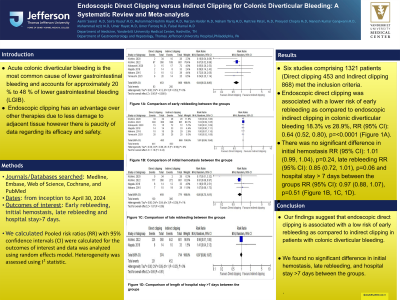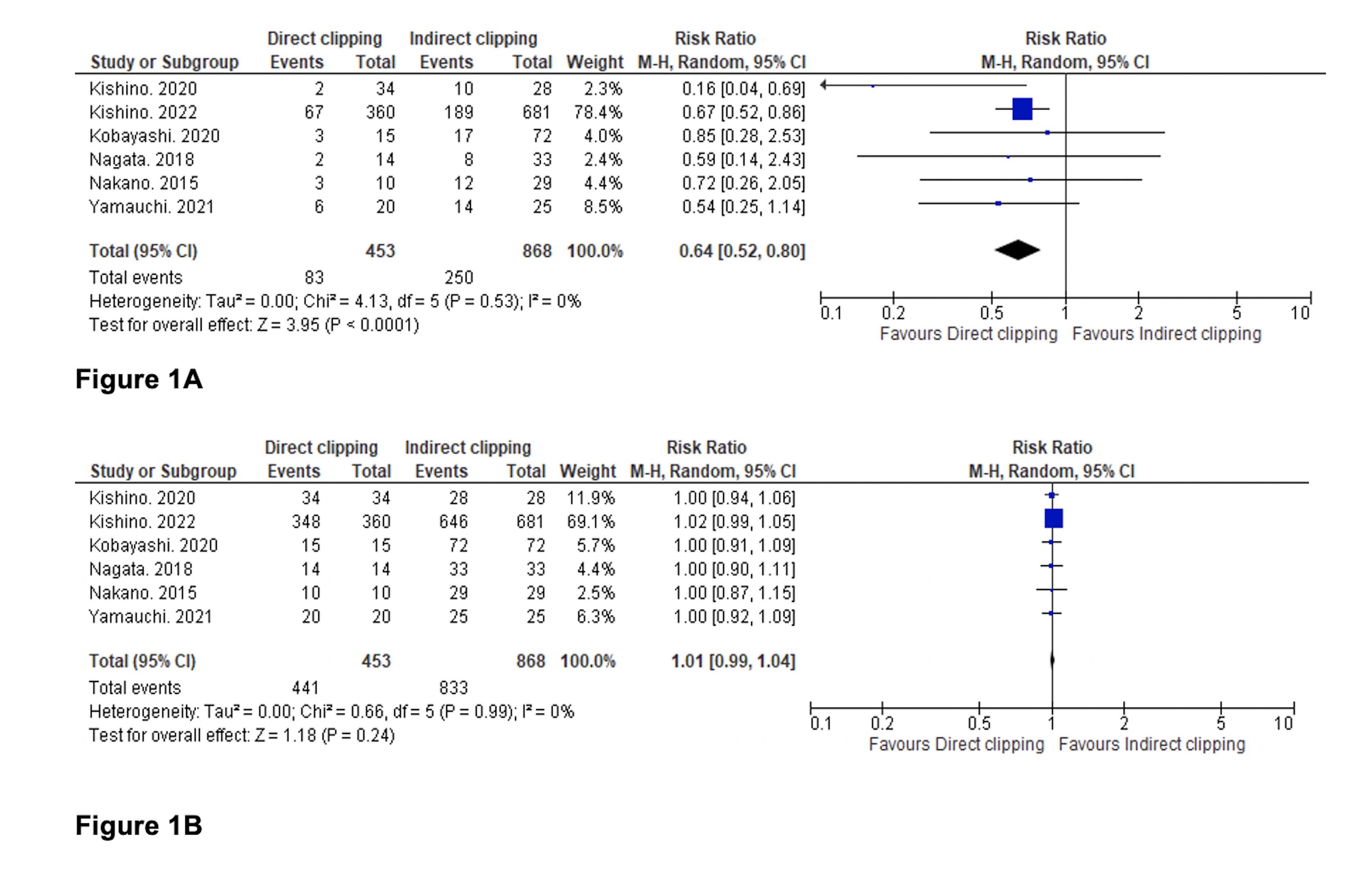Sunday Poster Session
Category: GI Bleeding
P0732 - Endoscopic Direct Clipping vs Indirect Clipping for Colonic Diverticular Bleeding: A Systematic Review and Meta-Analysis
Sunday, October 27, 2024
3:30 PM - 7:00 PM ET
Location: Exhibit Hall E

Has Audio
- FK
Faisal Kamal, MD
Sidney Kimmel Medical College at Thomas Jefferson University
Philadelphia, PA
Presenting Author(s)
Aamir Saeed, MD1, Saira Yousuf, MD1, Muhammad Hayat, MD1, Marjan Haider, MD2, Preeyati Chopra, MD3, Maham Tariq, MD4, Maitree Patel, MD5, Manesh Kumar Gangwani, MD6, Muhammad Aziz, MD7, Umar Hayat, MD8, Umer Farooq, MD9, Faisal Kamal, MD10
1Vanderbilt University Medical Center, Nashville, TN; 2Trinity Health Ann Arbor Hospital, Ann Arbor, MI; 3Medical College, Patiala, Punjab, India; 4Services Institute of Medical Sciences, Lahore, Punjab, Pakistan; 5Palmetto General Hospital, Hialeah, FL; 6University of Toledo, Toledo, OH; 7Bon Secours Mercy, Toledo, OH; 8Geisinger Wyoming Valley Medical Center, Wilkes-Barre, PA; 9SSM Health Saint Louis University Hospital, St. Louis, MO; 10Sidney Kimmel Medical College at Thomas Jefferson University, Philadelphia, PA
Introduction: Acute colonic diverticular bleeding is the most common cause of lower gastrointestinal bleeding (LGIB). Various endoscopic treatments for diverticular bleeding include endoscopic band ligation (EBL), endoscopic clipping (EC), and detachable snare ligation therapy. EBL is associated with a lower risk of early rebleeding; however, adverse events have been reported with this therapy. Endoscopic clipping has an advantage over other therapies due to less damage to adjacent tissue however there is paucity of data regarding its efficacy and safety. We conducted a systematic review and meta-analysis to compare the outcomes of endoscopic direct and indirect clipping in colonic diverticular bleeding.
Methods: Several databases were reviewed to identify studies comparing outcomes of endoscopic direct clipping and indirect clipping in patients with LGIB due to diverticulosis from inception to April 30th, 2024. The databases searched included PubMed, Web of Science Core Collection, Embase, and the Cochrane Database of Systematic Reviews. Our outcomes of interest were early rebleeding, late rebleeding, and initial hemostasis, blood transfusion rate, and hospital stay > 7 days. We calculated risk ratios (RRs) with 95% confidence intervals (CIs) for all dichotomous variables and mean difference with 95% CI for continuous variables. Data was analyzed using Mantel-Haenszel random effect model. Heterogeneity was assessed using the I2 statistic.
Results: Six studies comprising 1321 patients (Direct clipping 453 and Indirect clipping 868) met the inclusion criteria. We found that, endoscopic direct clipping was associated with a significantly lower risk of early rebleeding compared to endoscopic indirect clipping, RR (95% CI): 0.64 (0.52, 0.80). (Figure 1A). There was no significant difference in rate of initial hemostasis between groups, RR (95% CI): 1.01 (0.99, 1.04), p=0.24 (Figure 1B). We also found no significant difference rate of rebleeding between groups, RR (95% CI): 0.85 (0.72, 1.01), p=0.06. We also found no significant difference in other outcomes between groups, such as rate of blood transfusion; RR (95% CI): 0.93 (0.56, 1.52), p=0.77, and the hospital stay > 7 days; RR (95% CI): 0.97 (0.88, 1.07), p=0.51.
Discussion: Our meta-analysis demonstrates the superiority of endoscopic direct clipping over indirect clipping in reducing the risk of early rebleeding in patients with LGIB associated with diverticulosis. We found no significant difference in other outcomes between groups.

Disclosures:
Aamir Saeed, MD1, Saira Yousuf, MD1, Muhammad Hayat, MD1, Marjan Haider, MD2, Preeyati Chopra, MD3, Maham Tariq, MD4, Maitree Patel, MD5, Manesh Kumar Gangwani, MD6, Muhammad Aziz, MD7, Umar Hayat, MD8, Umer Farooq, MD9, Faisal Kamal, MD10. P0732 - Endoscopic Direct Clipping vs Indirect Clipping for Colonic Diverticular Bleeding: A Systematic Review and Meta-Analysis, ACG 2024 Annual Scientific Meeting Abstracts. Philadelphia, PA: American College of Gastroenterology.
1Vanderbilt University Medical Center, Nashville, TN; 2Trinity Health Ann Arbor Hospital, Ann Arbor, MI; 3Medical College, Patiala, Punjab, India; 4Services Institute of Medical Sciences, Lahore, Punjab, Pakistan; 5Palmetto General Hospital, Hialeah, FL; 6University of Toledo, Toledo, OH; 7Bon Secours Mercy, Toledo, OH; 8Geisinger Wyoming Valley Medical Center, Wilkes-Barre, PA; 9SSM Health Saint Louis University Hospital, St. Louis, MO; 10Sidney Kimmel Medical College at Thomas Jefferson University, Philadelphia, PA
Introduction: Acute colonic diverticular bleeding is the most common cause of lower gastrointestinal bleeding (LGIB). Various endoscopic treatments for diverticular bleeding include endoscopic band ligation (EBL), endoscopic clipping (EC), and detachable snare ligation therapy. EBL is associated with a lower risk of early rebleeding; however, adverse events have been reported with this therapy. Endoscopic clipping has an advantage over other therapies due to less damage to adjacent tissue however there is paucity of data regarding its efficacy and safety. We conducted a systematic review and meta-analysis to compare the outcomes of endoscopic direct and indirect clipping in colonic diverticular bleeding.
Methods: Several databases were reviewed to identify studies comparing outcomes of endoscopic direct clipping and indirect clipping in patients with LGIB due to diverticulosis from inception to April 30th, 2024. The databases searched included PubMed, Web of Science Core Collection, Embase, and the Cochrane Database of Systematic Reviews. Our outcomes of interest were early rebleeding, late rebleeding, and initial hemostasis, blood transfusion rate, and hospital stay > 7 days. We calculated risk ratios (RRs) with 95% confidence intervals (CIs) for all dichotomous variables and mean difference with 95% CI for continuous variables. Data was analyzed using Mantel-Haenszel random effect model. Heterogeneity was assessed using the I2 statistic.
Results: Six studies comprising 1321 patients (Direct clipping 453 and Indirect clipping 868) met the inclusion criteria. We found that, endoscopic direct clipping was associated with a significantly lower risk of early rebleeding compared to endoscopic indirect clipping, RR (95% CI): 0.64 (0.52, 0.80). (Figure 1A). There was no significant difference in rate of initial hemostasis between groups, RR (95% CI): 1.01 (0.99, 1.04), p=0.24 (Figure 1B). We also found no significant difference rate of rebleeding between groups, RR (95% CI): 0.85 (0.72, 1.01), p=0.06. We also found no significant difference in other outcomes between groups, such as rate of blood transfusion; RR (95% CI): 0.93 (0.56, 1.52), p=0.77, and the hospital stay > 7 days; RR (95% CI): 0.97 (0.88, 1.07), p=0.51.
Discussion: Our meta-analysis demonstrates the superiority of endoscopic direct clipping over indirect clipping in reducing the risk of early rebleeding in patients with LGIB associated with diverticulosis. We found no significant difference in other outcomes between groups.

Figure: Comparison of early rebleeding (Figure 1A) and initial hemostasis (Figure 1B) between the groups
Disclosures:
Aamir Saeed indicated no relevant financial relationships.
Saira Yousuf indicated no relevant financial relationships.
Muhammad Hayat indicated no relevant financial relationships.
Marjan Haider indicated no relevant financial relationships.
Preeyati Chopra indicated no relevant financial relationships.
Maham Tariq indicated no relevant financial relationships.
Maitree Patel indicated no relevant financial relationships.
Manesh Kumar Gangwani indicated no relevant financial relationships.
Muhammad Aziz indicated no relevant financial relationships.
Umar Hayat indicated no relevant financial relationships.
Umer Farooq indicated no relevant financial relationships.
Faisal Kamal indicated no relevant financial relationships.
Aamir Saeed, MD1, Saira Yousuf, MD1, Muhammad Hayat, MD1, Marjan Haider, MD2, Preeyati Chopra, MD3, Maham Tariq, MD4, Maitree Patel, MD5, Manesh Kumar Gangwani, MD6, Muhammad Aziz, MD7, Umar Hayat, MD8, Umer Farooq, MD9, Faisal Kamal, MD10. P0732 - Endoscopic Direct Clipping vs Indirect Clipping for Colonic Diverticular Bleeding: A Systematic Review and Meta-Analysis, ACG 2024 Annual Scientific Meeting Abstracts. Philadelphia, PA: American College of Gastroenterology.
